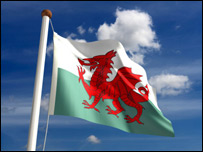Take Away English-National Symbols 民族象征(在线收听)

A dragon - the national symbol of Wales
|
For Chinese people however, the dragon is not an evil monster. It's a cultural and spiritual symbol for prosperity and good luck. The dragon’s main task is to create harmony and bring rain. Dragons are celebrated in art and architecture, and of course the dragon dance is a very popular ritual. Millions of Chinese have the word ‘long’, meaning dragon, as part of their name.
China isn't the only country to have the dragon as its symbol. Wales, one of the four countries in the UK, has a red dragon proudly displayed on its flag. The only other country in the world with a dragon on its flag is Bhutan, the tiny country between China and India.
Almost all countries in the world have an animal symbol to represent their country, and it is particularly obvious during sports. The English see lions as brave, proud animals and the England football team have three lions on the front of their football shirts.
Australia is famous for kangaroos, of course. The national rugby team is more commonly know as the Wallabies, a kind of small kangaroo. Similarly, the South African team are known as the Springboks, a type of African antelope, and the New Zealanders, whether playing sports or not, are commonly known as Kiwis. A kiwi is a native New Zealand bird that can't fly.
All countries are proud of their symbols, which they feel reflect national characteristics or the beauty and variety of their natural environments. Recently, a Shanghai professor claimed that using the dragon as a national symbol could make western countries have a negative view of China. But in an internet survey 90% of Chinese people wanted to keep the dragon, and as we are all familiar with that Chinese symbol, people in the west would no doubt want China to keep the dragon too.
|
GLOSSARY 词汇表 |
|
|
dragon legends maidens spiritual harmony ritual flag kangaroos antelope characteristics |
aggressive monster knights evil prosperity architecture proudly brave rugby native survey |